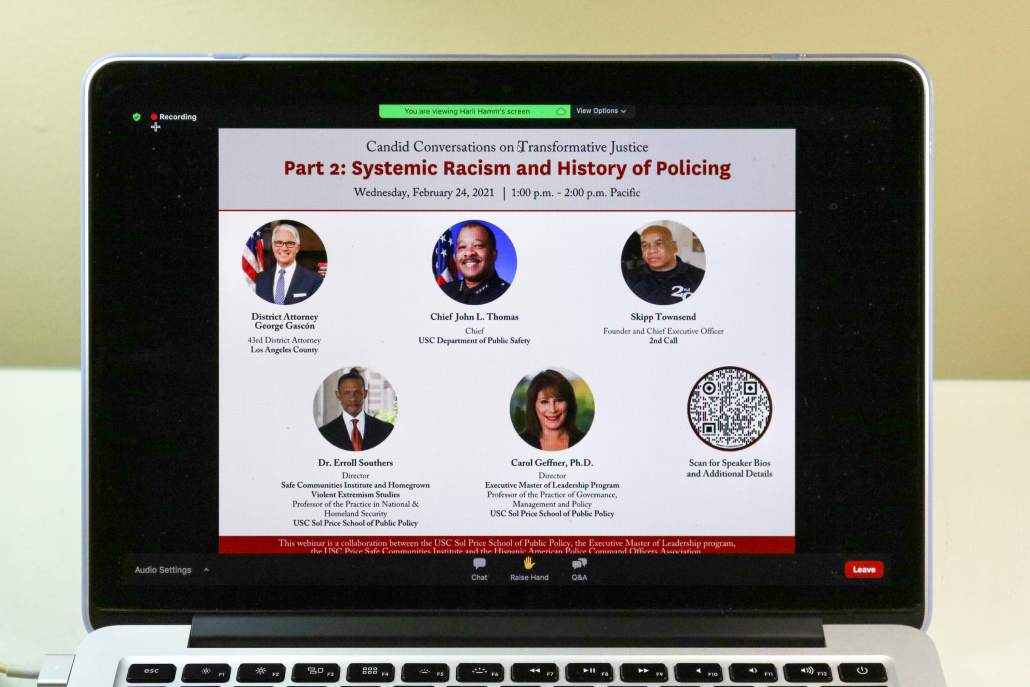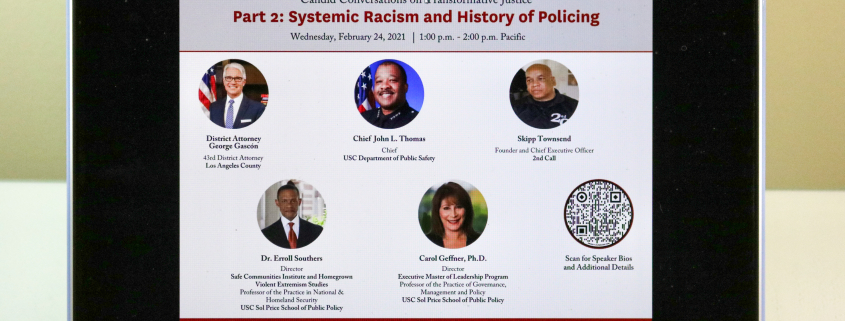USC Price school holds panel on systemic racism in policing

After a summer of protests and discussions about policing in response to the Black Lives Matter movement, the election of Los Angeles District Attorney George Gascón — who campaigned as one of the country’s most progressive district attorneys — was a major victory for activists. Gascón promised significant changes to the criminal justice system, including the end of the death penalty in LA, the end of charging children as adults and the end of sentencing enhancements. But during his first few months in office, his policies received significant pushback, primarily from law enforcement officials and prosecutors.
However, various stakeholders, including DA Gascón, USC Department of Public Safety Chief John Thomas and Skipp Townsend — the founder of the activist organization 2nd Call— came together in a Zoom panel to discuss a path forward Wednesday. The panel was hosted by the USC Executive Master of Leadership program, the USC Price Safe Communities Institute and the Hispanic American Police Command Officers Association, and was moderated by Executive Master of Leadership Program Director Carol J. Geffner.
Erroll Southers, the Director of the Safe Communities Institute, introduced the speakers, setting the tone for the discussion by quoting North Carolina Sheriff Hubert Peterkin, who said that law enforcement needs to say six words: “We are part of the problem.”
Thomas, who grew up in South L.A. and patrolled those same streets as an officer, echoed that sentiment, citing law enforcement’s history as slave patrols and enforcers of Black codes and Jim Crow laws.
“All of those things that were designed to ensure that Black people ‘knew their place’ in American society were enforced by law enforcement,” Thomas said. “We have to own that. I’ve been in this profession 36 years, we have to own that legacy and we have to train to [address] it. Officers should be hired based upon awareness of these sensitivities and these cultural sensitivities.”
Gascón, a former police officer himself, spoke about his journey from part of the system to a force working to change it.
“I readily admit that I was part of the system … I embraced a culture,” Gascón said. “What became very obvious to me as I grew up in the organization was that so much of what we were doing really wasn’t providing any more safety. To the contrary, I think it was creating more insecurity; it was certainly enhancing the racism that is embedded into the system, in that we were socially and economically destroying our communities.”
Gascón said he realized that the system is not broken, but is working the way it was intended to when it was first designed. Reform, therefore, is inadequate, according to Gascón — during his campaign, he created initiatives to restructure and reimagine the system, including ending sentencing kids as adults, stopping sentence enhancements and removing the death penalty.
“The death penalty doesn’t work,” Gascon said. “It doesn’t work socially, economically and it certainly doesn’t provide any improvement for our community safety. But we do know that it [has] a very racist application, especially in L.A. County, [and] throughout the nation.”
When elected, Gascón immediately implemented the changes he campaigned on — and then received immediate pushback. The pushback, he said, is driven by underlying racism, economic interests and political power.
“We know that law enforcement, especially police unions, and, you know, prosecutors, unions, have for years, exerted a disproportionate amount of political influence in our legislative and our political system,” Gascon said. “We basically wanted to break away from that mold and really start hitting in a different direction.”
Townsend spoke about how, in his activism, he’s seen people fight against movements that aim to get people home from jails and prisons because of fear. Those are the people fighting Gascón’s reforms, he said.
“There’s a fear of that individual coming home — not knowing where their mentality is, where their mindset is,” Townsend said.
Thomas also stressed that, while police need to change, every solution cannot be dropped at the foot of law enforcement.
“Unless these other institutions are dealt with and actually reformed as well, it’s still not addressing the conditions in these communities,” Thomas said. “At the end, we’re still talking about a broken healthcare system, a broken educational system. We still haven’t dealt with community trauma, which is the root of a lot of the criminality that goes on.”
Hannah Findling, a master’s student studying public administration who attended the event, said that she was grateful for the event and hopes to see more discussions like this.
“I think it’s really easy for those with privilege in our society, myself included, to be ignorant of so much of what happens around us,” Findling said. “And the publicity and emotion and everything that resulted from the death of George Floyd made it a topic that everyone needed to talk about … Social media has been a really powerful tool in raising awareness, but I think these more in depth discussions with community members are what really starts to lead to change.”

